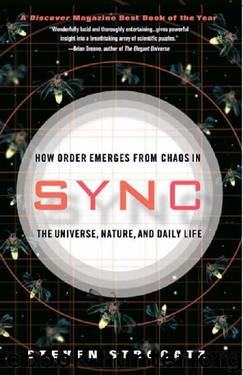Sync: How Order Emerges From Chaos in the Universe, Nature, and Daily Life by Steven H. Strogatz

Author:Steven H. Strogatz
Language: eng
Format: azw3, mobi
ISBN: 9780786887217
Publisher: Hachette Books
Published: 2004-04-13T16:00:00+00:00
What’s so surprising here is that the waterwheel turns erratically, even though there’s nothing erratic about the way it is being driven. The water is pumped in at a steady rate. Yet the wheel can’t seem to make up its mind. What’s even more disconcerting is that the behavior is not reproducible. The next time you turn on the waterwheel, its pattern of reversals will be different. If you take tremendous care to ensure that everything is almost the same as it was the last time, its motion will track for a while but then diverge, yielding a completely unrelated sequence of turns and reversals thereafter.
Of course, if you started the wheel absolutely the same way, it would repeat. That’s what it means to be deterministic: The current state determines the future state uniquely. The motion of the wheel is governed by deterministic equations—Newton’s laws of motion and the laws of fluid mechanics—so in principle, if you knew all the variables initially, you could predict the wheel’s motion forever into the future. The equations themselves contain no noise or randomness or other sources of uncertainty. Furthermore, if you solve the equations on a computer, using the same starting values for all the variables, the predicted outcome will be the same every time. In that sense, everything is reproducible.
But in the real world outside the computer, the variables are never exactly the same from run to run. The slightest difference—a drop of water in one of the chambers, left over from the previous experiment, or a puff of air exhaled by an overexcited spectator—will alter the motion of the wheel, at first imperceptibly, but very soon with incalculable consequences.
These, then, are the defining features of chaos: erratic, seemingly random behavior in an otherwise deterministic system; predictability in the short run, because of the deterministic laws; and unpredictability in the long run, because of the butterfly effect.
The phenomenon of chaos raises some subtle philosophical issues that can trick the unwary. For example, a few of my students have pooh-poohed the butterfly effect as obvious. We all know that little things can make a big difference in the course of our own lives, and even in the lives of nations. With so many complexities, so many variables unaccounted for, insignificant events can sometimes trigger disproportionate chain reactions. Think of the ancient verse about the downfall of a kingdom:
For want of a nail, the shoe was lost;
For want of a shoe, the horse was lost;
For want of a horse, the rider was lost;
For want of a rider, the battle was lost;
For want of a battle, the kingdom was lost!
But what was not widely appreciated until chaos theory was that similar cascades can afflict even the simplest systems: waterwheels and tumbling moons and dripping faucets, mechanical systems where all the laws are known and there are only a few variables. Even there, the seeds of chaos lie dormant, ready to unfold their surprises.
Another subtlety: In chaos, every point is a point of instability. It’s worse
Download
Sync: How Order Emerges From Chaos in the Universe, Nature, and Daily Life by Steven H. Strogatz.mobi
This site does not store any files on its server. We only index and link to content provided by other sites. Please contact the content providers to delete copyright contents if any and email us, we'll remove relevant links or contents immediately.
Sapiens: A Brief History of Humankind by Yuval Noah Harari(14389)
The Tidewater Tales by John Barth(12659)
Mastermind: How to Think Like Sherlock Holmes by Maria Konnikova(7343)
The Thirst by Nesbo Jo(6944)
Do No Harm Stories of Life, Death and Brain Surgery by Henry Marsh(6941)
Why We Sleep: Unlocking the Power of Sleep and Dreams by Matthew Walker(6722)
Life 3.0: Being Human in the Age of Artificial Intelligence by Tegmark Max(5558)
Sapiens by Yuval Noah Harari(5370)
The Body: A Guide for Occupants by Bill Bryson(5096)
The Longevity Diet by Valter Longo(5064)
The Rules Do Not Apply by Ariel Levy(4969)
The Immortal Life of Henrietta Lacks by Rebecca Skloot(4587)
Animal Frequency by Melissa Alvarez(4470)
Why We Sleep by Matthew Walker(4445)
The Hacking of the American Mind by Robert H. Lustig(4381)
Yoga Anatomy by Kaminoff Leslie(4363)
All Creatures Great and Small by James Herriot(4321)
Double Down (Diary of a Wimpy Kid Book 11) by Jeff Kinney(4269)
Embedded Programming with Modern C++ Cookbook by Igor Viarheichyk(4179)
